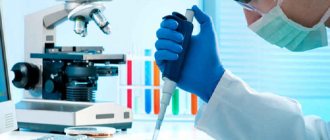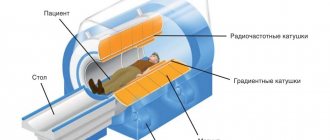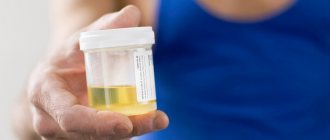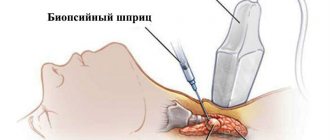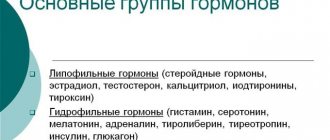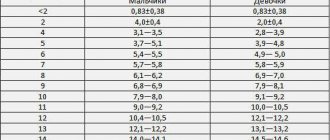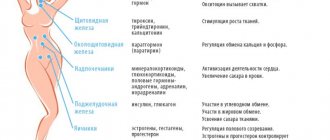Now you will find out what tests you need to take for thyroid hormones. A screening study involves a superficial assessment of the functional activity of the thyroid gland. For a more accurate differential examination, an analysis is carried out with a set of expanded indicators, and ultrasound and biopsy are also used. The main pathologies of the thyroid gland detected during screening:
- excess or insufficient amounts of hormones;
- autoimmune diseases;
- Graves' disease;
- oncology;
- cretinism;
- myxedema.
These diseases significantly reduce a person's quality of life. In this case, not only the internal organs suffer, but also the appearance. The formation of diffuse toxic goiter is accompanied by a significant increase in the neck area, as well as the appearance of specific eye symptoms (swelling of the eyelids, “bulging eyes”, etc.).
The importance of timely examination is undeniable, since it will significantly improve the prognosis of the outcome and select more gentle treatment methods. An extremely severe stage of the disease requires surgery to remove the area or the entire organ. Then the patient is forced to take hormone replacement therapy for life.
Indications for analysis
The hormones of this gland are special substances characterized by high biological activity. Their synthesis occurs not only in the thyroid gland, but also in the pituitary gland. These hormones are responsible for many functions of the body, for example, the metabolism of carbohydrates, fats and proteins, sexual function, emotional and mental state, as well as the functioning of many systems, in particular the gastrointestinal tract and cardiovascular.
Deviations from the norm in any direction indicate the presence of disturbances in the functioning of the body due to the improper functioning of this gland, while the production of hormones can be either insufficient or excessive.
Most often, indications for prescribing a hormone test are:
- Abnormalities are suspected, and a study is carried out to identify possible hyperthyroidism or hypothyroidism.
- The presence of delayed sexual and mental development in children.
- The need to confirm the presence of diffuse toxic goiter. If the result is positive, hormone tests are carried out regularly according to plan to monitor the patient’s condition and disease.
- Disturbances in the functioning of the heart, in particular arrhythmia.
- Presence of infertility.
- Baldness (alopecia).
- Decreased sexual activity and libido levels.
- Presence of impotence.
- Irregular menstruation, primarily its absence (amenorrhea).
- Obesity.
Indications for testing TSH levels in the blood
The doctor will advise the patient to donate blood for thyroid hormones if they suspect various diseases. The analysis is indicated if the following symptoms are present:
- swelling and dryness of the skin;
- sudden changes in weight up or down;
- stomach problems (if gastrointestinal pathologies are not detected);
- tachycardia, arrhythmia;
- feeling of anxiety for no apparent reason, panic attacks;
- constant feeling of fatigue, weakness;
- hair loss;
- delayed sexual development in children;
- lack of sensitivity to low temperatures;
- constant low body temperature (up to 35.5 degrees);
- failure of the cyclicity of menstruation;
- sleep disorders;
- long-term depression;
- tremor of the upper extremities;
- psycho-emotional instability;
- decreased sexual desire, impotence;
- infertility (especially in combination with amenorrhea);
- mental retardation in children;
- dryness and constant irritation of the mucous membranes of the eyes;
- myopathy (progressive muscle atrophy);
- other suspicions of problems with hormones.
It is recommended for all expectant mothers to donate blood for thyroid hormones in order to timely detect pathologies that may not only pose a threat to the health of the fetus, but also create a risk of miscarriage. The analysis is prescribed to monitor changes in the health status of patients during replacement therapy with synthetic hormones.
Which thyroid hormones should be tested?
When conducting a test for thyroid hormones, you need to take several parameters at once:
- Thyrotropin (thyroid-stimulating hormone or TSH), which is a pituitary hormone. It is this hormone that has a stimulating effect on the thyroid gland and its production of such important hormones as T4 and T3. If the pituitary gland works normally, then in case of disturbances in the functioning of the thyroid gland, a change in the concentration of the hormone may be observed downward when the gland is overworking, and upward when the gland is working insufficiently.
- Free triiodothyronine (T3 free) , which is a thyroid hormone responsible for the metabolic processes of oxygen in cells and tissues.
- Free thyroxine (T4 free) , which is one of the main hormones synthesized by the thyroid gland. This hormone in the body is responsible for the production of protein and is a stimulator of this process.
When testing the blood, AT-TG is also determined - antibodies to thyroglobulin. This substance is a special antibody to a special protein, which is a precursor to thyroid hormones.
AT-TG is very important in diagnosis, since it allows you to identify diseases of the thyroid gland that are autoimmune in nature, for example, autoimmune thyroiditis of the atrophic type, Hashimoto's disease, as well as toxic goiter of the diffuse type.
The analysis also detects AT-TPO - antibodies to thyroid peroxidase, sometimes called microsomal antibodies. This test is the most sensitive in detecting disorders of the thyroid gland of an autoimmune nature, since the substance is a special autoantibody to a cellular enzyme.
Now you know what tests are done for thyroid hormones - let's move on to deciphering the results of the study.
How to normalize the functioning of the thyroid gland? Natural remedies to stabilize hormonal levels
How to normalize the functioning of the thyroid gland? In conditions where almost half of the population of our planet metabolizes far from properly, such a question seems especially relevant.
To solve this problem, modern medicine offers, first of all, drugs based on synthetic analogues of thyroid hormones. A significant disadvantage of this type of therapy is the high risk of side effects. You need to understand that artificial hormones are different from their natural counterparts and therefore it is impossible to predict how they will behave in the body.
Iodine-containing drugs are far from the best suited for these purposes, the infatuation with which can have the opposite effect: provoke the occurrence of diffuse toxic goiter or the development of thyroid adenoma.
And finally, surgery as a last resort in the treatment of thyroid diseases also does not bring patients the desired relief. In most cases, after it is carried out, the patient will be prescribed lifelong use of the same hormonal drugs.
That is why it is important to monitor the condition of the thyroid gland at any age, as well as to take care of its safety. A reliable and safe remedy for supporting a key endocrine organ is the natural drug Thyreo-Vit . It contains white cinquefoil , a powerful natural stimulator of thyroid hormones. The unique chemical composition of this plant helps it act in two directions at once - eliminate the consequences of both hypothyroidism and hyperthyroidism .
Another important component of Thyreo-Vit is kelp - a valuable natural source of safe and easily digestible iodine , necessary for stable functioning of the thyroid gland.
In addition, the said drug contains Echinacea purpurea , a powerful herbal immunomodulator designed to strengthen the body's protective barriers weakened by thyroid dysfunction.
USEFUL TO KNOW:
ABOUT JOINT DISEASES
How to avoid joint pain?
JOINTS Author: admin625.12.2018Leave a comment
No one thinks about how to avoid pain in the joints - the thunder hasn’t struck, why install a lightning rod. Meanwhile, arthralgia - the name of this type of pain - affects half of people over forty and 90% of those over seventy. So preventing joint pain is something worth considering, even if you...
Read more
ABOUT HORMONE THERAPY
The power of hormones. What active substances regulate cartilage restoration?
HORMONES Author: admin1110.12.2018 Leave a comment
A person’s condition and the coherence of the organs of his body are largely determined by hormonal balance. Cartilage restoration is also subject to the influence of ubiquitous life regulators. Without normalizing hormonal levels, complete regeneration of the joint is impossible. What strings does the invisible puppeteer, the endocrine system, pull, influencing cartilage tissue? Testosterone This hormone is produced by the gonads and the adrenal cortex, as in...
Read more
ABOUT BONE DISEASES
Side effects of antibiotics. Find out now how to protect your bones
BONES Author: admin1101.09.2020
Side effects of antibiotics are not limited to digestive problems. Today, scientists and doctors are discovering more and more of their side effects. Unfortunately, it is often impossible to refuse antibiotics. But you can find out what their danger is and take measures to minimize the risk.
Read more
ABOUT CONNECTIVE TISSUE DISEASES
ABOUT VITAMINS FOR BONES
May there always be sunshine! What is vitamin D for?
VITAMINSAuthor: admin311.12.2018Leave a comment
Sunlight for a person is not only a source of good mood, joy and happiness. When it comes into contact with the retina and skin, a large number of physiological processes are triggered in the body, for example, the synthesis of calciferol. What is vitamin D for, besides improving calcium absorption? How to compensate for its deficiency if exposure to ultraviolet rays of the sun is undesirable for a person? For…
Read more
DIAGNOSIS OF OSTEOPOROSIS
Decoding the research results
It is important that only an experienced doctor interpret the results of such a study.
You should not try to decipher the analysis of thyroid hormones yourself, since only a qualified specialist - an endocrinologist - can make an accurate diagnosis.
The results may vary, for example:
- If TSH increases, we can conclude that the patient has a state of hypothyroidism, when the thyroid gland performs its functions at an insufficient level. But here the T4 and T3 indicators will also be an important point. With an increase in TSH, but a decrease in T4, we can talk about the presence of obvious hypothyroidism, called manifest. If the T4 level is normal against the background of an increase in TSH, then the form of hypothyroidism is defined as subclinical.
- If the TSH value is normal, but T4 is decreased, the test will need to be retaken in another laboratory, since such results are a clear error in the study in almost 99% of cases.
- If the TSH test results are normal, but there is a reduced T3 value, it is also necessary to retake the test, since such data are also considered a laboratory error.
- The analysis will also need to be retaken if the results show a decrease in T3 concentration against the background of normal TSH and T4 values.
- An error in the study is the result in which, against the background of normal TSH, there is an increase in the values of T3 and T4 or one of them. In this case, the study will also need to be repeated.
- A decrease in TSH in most cases may indicate an excess of gland hormones, that is, the presence of a condition of thyrotoxicosis. The presence of overt thyrotoxicosis is indicated by an increase in the level of T3 or T4 against the background of a decrease in the TSH value. If T4, like T3, are normal against the background of a decrease in TSH, then thyrotoxicosis has a subclinical form, and its degree is determined by the TSH value.
Rules for preparing for analysis
To obtain the most accurate results, a patient sent for analysis should adhere to a number of rules. It is often necessary to prepare for the study several months before blood sampling.
How to prepare for testing:
- One month before the test, stop taking thyroid hormones, if any are being taken.
- Stop taking iodine-containing drugs within three days.
- Blood sampling is carried out in the morning on an empty stomach.
- It is recommended not to eat 8-12 hours before the test. You are only allowed to drink water – clean, still water.
- During the day, do not consume tobacco, alcohol, sweets, tea, coffee, or sweet carbonated drinks.
- On the eve of the test, avoid physical activity.
- For half an hour before collecting the material, the patient should be in a state of complete rest.
- On the day of the test - before it, you should not undergo other examinations. This, in particular, applies to ultrasound, x-rays, fluorography, and physical procedures.
Rules for taking hormonal tests:
- Antibody content - TPO AT, is taken once, during the initial study. It is not defined again, since it remains unnamed.
- There is no need to take a parallel test for total and free hormones T3 and T4. Usually the content of free fractions is checked.
- During the initial study, a TG test is not taken. It can be prescribed for serious pathologies, for example, thyroid cancer.
- The TSH AT test does not fail during the first test either. Except in cases where the test is taken to confirm or refute thyrotoxicosis.
- They do not re-test for calcitonin if new nodes do not appear on the thyroid gland.
On a note! Older women often do not have any symptoms indicating a thyroid disorder. If the problem is not identified in time, there is a high risk of developing a stroke due to cardiac dysfunction.
Hormonal norm
In the conditions and possibilities of modern medicine, talking about any exact and strict standards for thyroid hormones is no longer relevant. Each laboratory sets its own normal values for the studied parameters of blood and other materials for analysis.
As a rule, the values of standards for each laboratory are determined by the features of the installed equipment, models of research devices, their settings, as well as the reagents used.
Established international standards are taken as the basis for the values , but each laboratory makes its own adjustments to the normal values. Although the difference in standards among many laboratories is small, in some situations it can be quite significant and create a false impression of the patient's condition, as well as lead to an incorrect diagnosis.
The international standard for thyroid-stimulating hormone concentration is considered to be a range of values from 0.4 to 4.0 µIU/ml.
The norm of the T4 hormone in most laboratories ranges from 9 to 19 pmol/l.
The T3 norm according to international standards ranges from 2.6 to 5.7 pmol/l. Determining the concentration of this particular hormone is the most difficult when examining the blood of patients, so most laboratory errors occur precisely in this indicator.
The normal level of antibodies to AT-TPO is usually from 0 to 20 IU/l, but in some laboratories there are values from 0 to 120 IU/l, as well as other data considered normal. Therefore, the forms of each laboratory should always indicate the established standards.
The normal value of antibodies to thyroglobulin ranges from 0 to 4.11 IU/l.
It is also important to remember that the norms largely depend on the patient’s age, as well as his gender.
Thyroxine (T4 hormone): free and total
What tests do you need to do for thyroid hormones? Analyzes are standard. For example, the T4 hormone circulating in the blood (not associated with blood proteins) is determined, which is produced under the control of TSH through a negative feedback mechanism. Most often, the test is prescribed together with measuring the concentration of TSH in the blood. With insufficient production of T4, the patient develops symptoms of hypothyroidism: the skin dries, fatigue increases, body weight increases, sensitivity to cold appears, and the menstrual cycle is disrupted. When the level of the hormone decreases (hyperthyroidism), the patient feels causeless anxiety, rapid heartbeat, sleep may be disturbed, weight loss, swelling appears, and sleep disturbances are typical.
An analysis of thyroid hormone is indicated in the diagnosis of thyroid dysfunction, causes of female infertility, congenital hypothyroidism, to monitor the effectiveness of treatment (at least once every three months), during pregnancy (in the presence of risk factors) and during preventive examination along with other laboratory diagnostic methods. The same test is performed on children born to mothers with thyroid diseases in the first days of life. The rules for preliminary preparation for blood collection are standard. Hormone levels are indicated in the tables in the article.
Reasons for deviations
An important point in diagnosing many body conditions and diseases is the simultaneous interpretation of all hormone analysis indicators. It is a systematic approach to studying the results that gives doctors a complete picture of the work of the patient’s pituitary gland and thyroid gland.
The presence of obvious hypothyroidism can be said when TSH concentrations are higher than normal and a decrease in the T4 hormone is observed. If, against the background of elevated TSH levels, the T4 hormone is within normal values, this may indicate that hypothyroidism occurs in a latent form. But in any of these cases, it should be remembered that such values indicate that the thyroid gland is literally working to the limit.
The important point is that if, against the background of an increase in the TSH hormone, there are no deviations in the T4 indicator, this indicates a special condition of the thyroid gland, its euthyroid status, and this poses a serious threat to the occurrence of many complex diseases, so the patient needs constant medical supervision .
An increase in TSH may occur due to:
- Various somatic or mental disorders.
- The presence of hypothyroidism, which has various etiologies.
- Pathologies or tumors of the pituitary gland.
- Disorders of TSH production.
- Insufficiency of the adrenal glands.
- Preclampsia.
- Thyroiditis.
- The presence of tumors in the body, for example, mammary glands or lungs.
But, in addition to an increase, TSH may also be decreased, which most often occurs due to frequent stressful situations, as well as the presence of mental disorders in a person. A decrease is also observed in cases of damage to the pituitary gland, its injuries or necrosis, as well as in the presence of thyrotoxicosis. To check the functioning of the thyroid gland, you need to take a blood test for hormones, the list of which is given above.
What tests to take
Women especially need to donate thyroid hormones, since they are the ones at risk. Without laboratory tests, it is impossible to understand the causes of many diseases, which means it is impossible to find effective treatment.
Considering the widespread prevalence of thyroid diseases, the negative environmental situation in cities and the unhealthy lifestyle of people, it would not hurt any woman to have her thyroid gland checked. These tests especially need to be taken by those who have crossed the forty-year mark.
What thyroid hormones are recommended for women to test for:
- TSH. Although it is produced by the pituitary gland, it has a huge impact on the functioning of the thyroid gland and controls the synthesis of two other important ones - T3 and T4. A high level of the thyroid-stimulating hormone TSH indicates the likelihood of hypothyroidism, the presence of tumors in the pituitary gland, mammary glands or lungs. A high level of TSH can also diagnose thyroid cancer. Reduced TSH accompanies Basedow's disease.
- T3. If, when tested for thyroid hormones, an increased level of triiodothyronine is detected, it means that there is thyrotoxicosis and iodine deficiency in the body. High T3 is also observed in hepatitis and AIDS. A low T3 level indicates hypothyroidism and a lack of a number of nutrients, pathologies of the kidneys, liver, and gastrointestinal tract. Low T3 is often diagnosed in women on strict diets.
- T4. When the concentration of thyroxine is high, hyperthyroidism is diagnosed. An elevated result may also indicate hepatitis, cirrhosis of the liver and malignant tumors on the thyroid gland. With low T3, a woman can be diagnosed with hypothyroidism, inflammation of the thyroid gland, problems with the adrenal glands and kidneys, as well as iodine deficiency.
- TG. This is a biochemical protein of complex structure that is produced only by the thyroid gland. The content of thyroglobulin is insignificant. It is mainly concentrated in the thyroid gland. If there are no pathologies in the body, TG in the blood is practically absent. A decrease in it can be caused by an overdose of certain medications, and an increase indicates the likelihood of thyroid cancer. TG is not given during the initial examination. The TG test is prescribed only to patients with certain pathologies.
In addition to basic studies, a woman may be recommended to undergo additional tests:
- AT TPO. These are antibodies in the blood to thyroid peroxidase. If the content of this immunoglobulin is elevated, they speak of hereditary hypothyroidism. If a high TSH is observed, then the likelihood of pathology increases significantly.
- AT TG. These are antibodies in the blood to thyroglobulin. High concentrations indicate a wide variety of autoimmune diseases.
- Calcitonin. This is one of the main tumor markers in the body. Thanks to the calcitonin test, it is possible to identify malignant neoplasms and metastases in the thyroid area.
Analysis of thyroid hormones during pregnancy
During the period of bearing a baby, the hormonal levels in the female body change greatly, which must be taken into account when deciphering research results. The chorion, and later the placenta, which develops in the uterus along with the baby, produces the hormone hCG, which has an effect on the thyroid gland similar to TSH.
During pregnancy, a large volume of hCG enters the woman’s blood, stimulating the functioning of the gland, and the synthesis of TSH decreases naturally, which is completely normal.
Since the TSH level is unstable during pregnancy, the concentration of free T4 becomes an important point for diagnosis. It is the free form of this hormone that in this case has diagnostic value.
In particular, if, against the background of a decrease in TSH, the level of T4 (free) remains normal, this is an indicator of a normal (physiological) pregnancy.
If, against the background of decreased TSH, a slight increase in T4 is detected, this does not indicate the exact presence of pathologies, but indicates that the woman has similar risks, and therefore it is necessary to monitor the development of pregnancy. But if at the same time free T4 has a significant excess and at the same time the concentration of T3 is increased, the woman requires urgent help from an endocrinologist and normalization of hormone levels.
An important point is that the total T4 indicator during pregnancy has no diagnostic value, since during this period its value is always increased, but this is not a pathology.
Antibody tests: is there a need?
What tests should I take for my thyroid gland? Tests are prescribed by a doctor (usually a therapist or endocrinologist) depending on the patient’s medical history and complaints. Experts often recommend taking not only TSH, T4 and T3, but also an antibody test. Is there a real need for this? The detection of antibodies indicates that some kind of autoimmune process is occurring in the body. The test is not used for primary diagnosis, but to clarify the diagnosis if the cause of a certain set of clinical symptoms has already been found. Antibodies do not require therapy, so elevated levels with normal TSH test results are not a cause for concern.
The concept of TSH and factors influencing the level of its concentration
The thyroid gland is an important component of the human endocrine system, which affects metabolic processes in the body and stimulates the proper functioning of all organs. If the production of necessary hormones by the pituitary gland is reduced, lethargy and indifference appear, unhealthy drowsiness and excessive sweating, libido decreases and joints hurt, cramps appear and the heart rhythm is disturbed, hair loss begins and dry skin appears. All these unpleasant symptoms are a direct consequence of the fact that the body has a deficiency of such an important element as thyroid-stimulating hormone.
The main function of the thyroid gland is the production of hormones that help maintain the normal course of many processes in the body. Any fluctuation in the amount of hormones from the normal state towards a decrease or increase is fraught with extremely serious consequences. Therefore, it is so important to identify a dangerous change in the amount of TSH in the body in time and take proactive measures. A blood test for thyroid hormones can show the level of their content. What is TSH? And when is it necessary to take a test to determine its level?
As mentioned above, TSH is called thyroid-stimulating hormone. Otherwise called thyrotropin or thyrotropin. It is responsible for regulating the functioning of the thyroid gland, and its main function is to influence the synthesis of the extremely important growth hormones T3 (triiodotyranine) and T4 (thyroxine). Their area of responsibility is managing energy production and controlling the metabolism of fats and proteins. TSH is also responsible for regulating iodine levels and enhancing lipolysis - the breakdown of fats entering the body into individual fatty acids. To determine whether deviations in the content of this hormone have appeared, it is necessary to donate blood for thyroid hormones. TSH may change under the influence of releasing factors secreted by neurosecretory cells of the hypothalamus.
The TSH level changes depending on what time of day the test is taken. This hormone reaches its peak content at night in the range of 2-4 hours or in the morning in the range from 6 to 8, the lowest content in the evening - from 17 to 19 hours. If the patient is awake at night, then a disturbance occurs in the process of TSH secretion. Pregnancy and lactation affect the decrease in hormone levels, and this is the norm. Some medications can have the same effect.
Thyroid gland - symptoms of the disease in men, treatment and signs
Diseases of the endocrine system are more common in women, but this does not mean that the thyroid gland in men is not subject to pathological changes. The organ can also develop disorders that affect most of the processes occurring in the body.
Thyroid diseases in men
The main purpose of the thyroid gland is to synthesize hormones that take part in various metabolic processes. Thyroid dysfunction can affect many functions of the body, including the digestive, genitourinary, nervous, cardiovascular and other systems. That is why it is important to promptly determine the development of the pathological process occurring in the thyroid gland.
All pathologies of the endocrine system, including those occurring in men, can be divided into the following groups:
- Hypothyroidism or insufficient production of hormones. The disease is characterized by a slowdown in most processes in the body, which leads to subsequent dysfunction of other organs.
- Hyperthyroidism or intense synthesis of hormones, leading to their excess. Metabolic processes occur with high intensity, which negatively affects all participating systems, organs and tissues.
- Thyroiditis or inflammation of the thyroid tissue. Occurs against the background of autoimmune changes, infectious or viral diseases. It can have an acute or chronic form.
- Goiter formation. There is a certain classification of this pathological process based on the etiology of the phenomenon, localization, functional activity and some other parameters. The main types are multinodular, diffuse, mixed.
- Neoplasms. This category of diseases includes not only benign formations, but also cancer, which is also diagnosed in men.
Diseases of the thyroid gland in men are practically no different from those that occur in women, only the frequency is noted. On average, of all patients, only about 15% are representatives of the stronger sex.
Symptoms
Each category of thyroid disease has its own specific symptoms, but if we combine the most characteristic ones, the following are noted:
- Changes in psycho-emotional state. Unreasonable mood swings, aggression, and apathy may occur. This is due to hormonal imbalance, and it can be caused by various reasons, but in some cases, by deviations in the functioning of the endocrine system.
- Weight change. Rapid weight loss is observed in hyperthyroidism, weight gain is observed in hypothyroidism.
- Hoarseness, sore throat, discomfort when swallowing.
- Cardiovascular system disorders, manifested in rapid pulse or arrhythmia, pressure surges, tachycardia.
- Changes in the shape of the neck, the area where the thyroid gland is located can be enlarged. Deformations of the neck are especially noticeable during the formation of a goiter.
- Increased sweating, temporary appearance of yeast or tremors.
- Gastrointestinal disorders, including intestinal dysfunction.
- Weakening of sexual desire.
- Hair loss, dermatological problems.
Symptoms can have different manifestations and intensity of expression, so they are not always noticed and are associated specifically with pathologies of the thyroid gland.
Treatment
It is up to the doctor alone to choose how to treat a disease of the endocrine system. Therapy is selected individually based on the clinical picture and diagnostic studies performed.
Treatment of thyroid pathologies is carried out primarily conservatively, but in the absence of positive dynamics or the presence of formations that require removal, surgical intervention is practiced. If we consider only drug therapy, then it is selected for a man individually and may include the following items:
- Hormonal medications necessary in cases of particularly passive thyroid gland (hypothyroidism).
- Medicines have a thyreostatic effect, that is, they suppress the intense synthesis of hormones, which is necessary for hyperthyroidism.
- Anti-inflammatory drugs if the disease is accompanied by similar reactions.
- If thyroiditis of infectious or viral origin is diagnosed, antibiotics or antiviral agents are selected.
- Immunostimulants that help activate the body's protective functions.
Despite the rarity of the development of thyroid disorders in men, the possibility of such dysfunctions should not be completely excluded. If suspicious symptoms are detected, it is advisable to consult an endocrinologist.
How are thyroid hormones synthesized and what are they needed for?
The basis for the creation of these biologically active substances is the amino acid tyrosine. During nutrition, iodine enters the body. For the body to function adequately, it needs to receive approximately 120-135 mcg of this microelement per day. After entering the intestine, it is absorbed by the villi of the epithelium and, with the blood flow, settles in the follicles of the organ. There, the process of incorporation of iodine into the matrix of thyroglobulin (protein, precursor of biologically active substances) occurs.
After this, differentiation of hormones into T3 and T4 occurs, depending on the number of microelement molecules in its composition.
You should also know that the amount of T4 synthesized is 20 times higher than T3. But the effectiveness of the latter is 6-8 times higher than the efficiency of thyroxine. That is why we cannot talk about the greater importance of this or that substance.
The main functions that these substances perform in the human body are the following:
- Activation of the thermoregulation center. Heat production and oxygen absorption increases in all tissues and cells with the exception of the main brain, spleen and testicles. They remain intact. That is why one of the symptoms of thyrotoxicosis or hyperthyroidism remains fever and profuse sweating.
- Stimulation of the formation of steroids by the adrenal cortex. T3 and T4 play an important role in the process of growth and development of the entire body. When they are deficient, mental and physical retardation is often observed.
- Increasing the body's intake of vitamins.
- Activation of nervous and mental activity of the main brain. In areas where the soil contains little iodine, children in schools are regularly given Antistrumin, a drug that contains a 5-day supply of this microelement. This is done to improve their academic performance and normalize the functioning of the central nervous system.
The question of how much of these substances is needed in the human body for its normal functioning has been well studied. There are special tables and generally accepted indicators that indicate the functional activity of the organ. It is enough to submit the material for examination and wait a little.
Survey
All thyroid-related laboratory tests should only be performed as directed by your healthcare provider. However, donating blood for testing for prevention is not prohibited. It often happens that the pathological process of thyroid disease has already started, but it proceeds covertly. Then it is possible to start treatment at an early stage, which will have a beneficial effect in the future.
There are several indications that indicate that it is necessary to check the condition of the thyroid gland:
- Hypothyroidism or hyperthyroidism. Determining the number of organ hormones will accurately indicate the functional activity of the parenchyma and thyrocytes.
- Delay in mental development of children.
- It is important to monitor treatment and therapy for hypothyroidism and diffuse toxic goiter.
- Disruption of the reproductive system, which can lead to infertility.
- Enlargement of the thyroid gland.
- Hair loss.
- Arrhythmia, extrasystole, tachycardia and other heart rhythm disturbances.
- Impotence, lack of attraction to the opposite sex.
- Lack of menstruation.
If the described situations arise, you should donate blood for tests, measuring hormones in the serum.
How to submit?
In order to maximally help the doctor see the true picture of the hormonal processes occurring in the body, each patient should know how to properly test thyroid hormones. When a person initially knows the entire procedure algorithm, he will try to accurately follow all instructions and will not do anything that could distort his performance. Therefore, it is advisable for the doctor to explain the entire procedure to the patient, explaining in detail how to donate blood for thyroid hormones.
All studies are completed according to a certain scheme. They need to be taken in the morning, from 8 to 11, after the TSH level has passed its peak and began to decline. According to experts, this test cannot be taken in a hurry, only after running to the delivery point and while still in an excited state. Before donating blood, you need to calm down and be in complete peace for 20-30 minutes so that the analysis is reliable. Only after this should blood sampling from the patient begin. In this case, blood is donated for thyroid hormones on an empty stomach. The method by which the level of TSH in the blood is determined is called chemiluminescent immunoassay on microparticles. With this method, blood serum is examined.
Blood is collected for analysis by taking it from the cubital vein on the right or left arm. The frequency of the test procedure is set by the doctor depending on the degree of complexity of the disease. Typically, if a patient has any abnormalities in the performance of its functions by the thyroid gland, such tests are performed twice a year.
